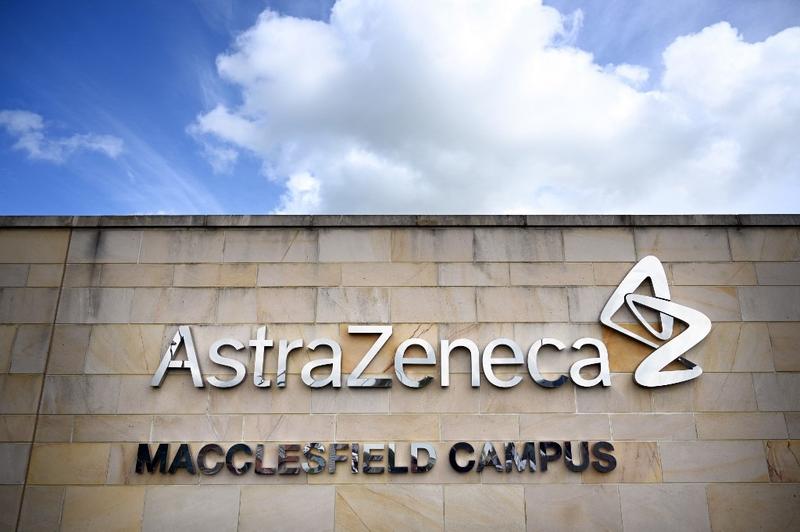 In this file photo taken on May 11, 2021,
a logo is pictured on a wall outside the offices of pharmaceutical company AstraZeneca in Macclesfield, central England. (PAUL ELLIS / AFP)
In this file photo taken on May 11, 2021,
a logo is pictured on a wall outside the offices of pharmaceutical company AstraZeneca in Macclesfield, central England. (PAUL ELLIS / AFP)
BRASILIA / PARIS / MOSCOW - AstraZeneca on Thursday cemented its lead in bringing a preventative COVID-19 shot for the non-infected to market for people who do not respond well to vaccines, saying its antibody drug cocktail offered 83 percent protection over six months.
The injected therapy, called AZD7442 or Evusheld, had previously been shown to confer 77 percent protection against symptomatic illness after three months, in an earlier readout of the late-stage PROVENT trial in August
The injected therapy, called AZD7442 or Evusheld, had previously been shown to confer 77 percent protection against symptomatic illness after three months, in an earlier readout of the late-stage PROVENT trial in August.
The Anglo-Swedish company also said a separate study in patients with mild-to-moderate COVID-19 showed a higher dose of AZD7442 cut the risk of symptoms worsening by 88 percent when given within three days of first symptoms.
The latest results from longer-term follow-ups potentially position AstraZeneca, like rival Pfizer as a future supplier of both COVID-19 vaccines and treatments, with AstraZeneca having said the therapy's "real advantage" was as a preventative shot.
"These new data add to the growing body of evidence supporting AZD7442's potential to make a significant difference in the prevention and treatment of COVID-19," Executive Vice President Mene Pangalos said in a statement.
Belgium
Belgium tightened its coronavirus restrictions on Wednesday, mandating wider use of masks and enforcing work from home, as cases spiked in the country's fourth COVID-19 wave.
From Saturday, all people in indoor venues such as cafes and restaurants will need to wear a mask unless seated and the rule will apply to those aged 10 or older. The previous age threshold was 12.
Nightclubs may have to test their guests if they want to let them dance mask-free. People wanting to eat in a restaurant or go to the theatre already must present a COVID-19 pass, showing vaccination, a negative test or recent recovery.
Most Belgians will also have to work from home four days a week until mid-December, and for three days after that.
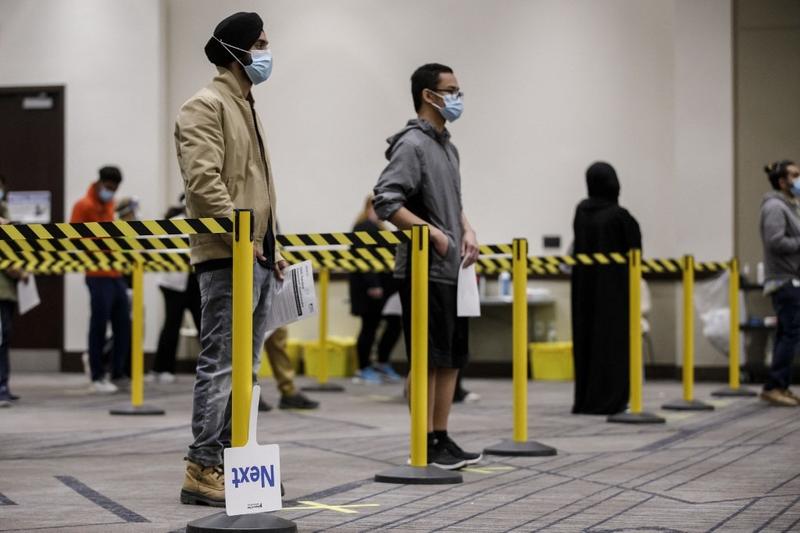 In this file photo taken on May 15, 2021, people wait for their COVID-19 vaccine inside the International Conference Center during Peel Region's "Doses After Dark" overnight COVID-19 vaccination clinic in Mississauga, Ontario, Canada. (COLE BURSTON / AFP)
In this file photo taken on May 15, 2021, people wait for their COVID-19 vaccine inside the International Conference Center during Peel Region's "Doses After Dark" overnight COVID-19 vaccination clinic in Mississauga, Ontario, Canada. (COLE BURSTON / AFP)
Canada
Canada is set to announce on Friday that it is no longer obliging Canadian travelers returning from short foreign trips to take expensive molecular COVID-19 tests, a government source said on Wednesday.
The travel industry complains that the requirement to take polymerase chain reaction tests, the most reliable commonly-used method of detecting COVID-19, is deterring tourism.
Canadians who make trips of 72 hours or less to the United States will no longer need a PCR test when they return home, said the source, who requested anonymity.
EU
It’s getting harder to be a vaccine holdout in Europe and continue with life as usual.
As governments battle another wave of the outbreak, new restrictions are being introduced, many aimed at the unvaccinated. That’s adding to the pressure on those who’ve resisted the shot so far.
Germany is proposing to limit access to the workplace to people who are inoculated, recovered or provide a negative test, and those who have refused shots are increasingly banned from cafes and hairdressers. The country, which has seen a surge in cases, has a vaccination rate below that of Italy, Spain and Portugal.
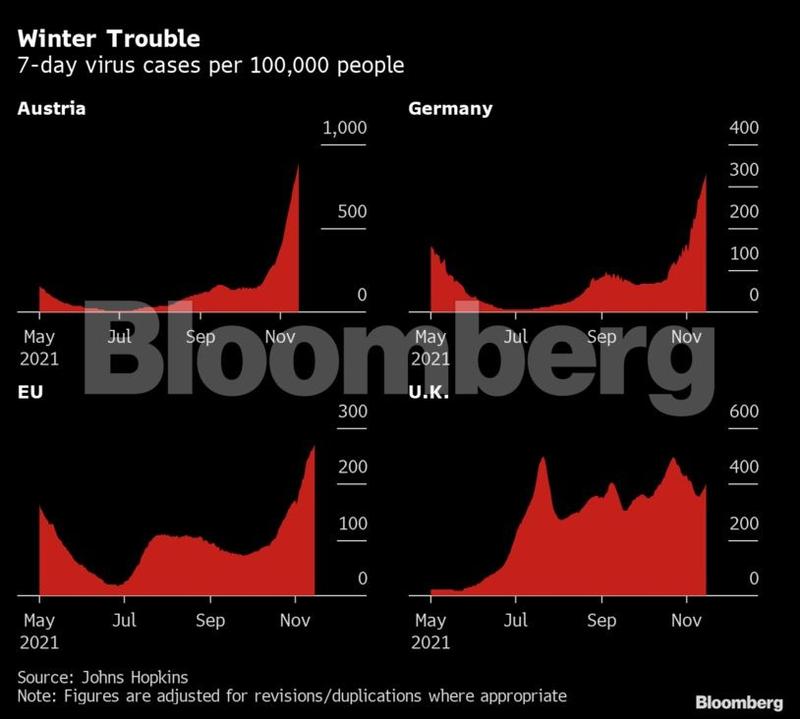
Ireland this week extended vaccine certs beyond restaurants and bars to include cinemas and theaters. And Austria set a new bar for tough measures with a lockdown on the unvaccinated, restricting their movements to work and shopping for essentials.
The moves mark a dramatic escalation in the campaign to increase vaccination rates, an effort that’s been given fresh impetus by the latest surge in COVID-19 cases.
Alongside measures in Germany and elsewhere, some regional leaders in Italy want authorities to replicate the Austrian model. They’ve asked that if any new restrictions are introduced, they should apply only to the unvaccinated. Czech authorities are set to implement a similar clampdown.
Hungary’s doctors on Wednesday called on Prime Minister Viktor Orban to introduce new curbs, including vaccine mandates for places such as restaurants and theaters. The country registered more than 10,000 new infections in the previous 24 hours.
Across the continent, governments have been slapping more and more restrictions on people who haven’t been inoculated in recent months, threatening fines and even suspending some health workers. The measures led to protests in a number of countries over the summer, some of which turned violent, as well as court battles.
In Austria, an anti-vax group won seats in a regional parliament in elections in September, a sign of how resistance is deeply embedded in some parts of society.
But for governments, toughening the rules is a necessary response amid repeated virus flare-ups.
ALSO READ: US secures GSK-Vir COVID-19 antibody drug doses worth $1b
“The fourth wave is hitting our country with full force,” German Chancellor Angela Merkel said Wednesday. “We urgently need to make progress on vaccinations.”
That’s creating a difficult situation for politicians, who are trying to get their countries through the pandemic without having to resort to another round of damaging widespread lockdowns.
And it’s not clear they’ll be able to avoid such drastic options. UK Prime Minister Boris Johnson this week warned that another lockdown can’t be ruled out this winter.
“History shows we cannot afford to be complacent,” Johnson said during a televised press conference.
That history lesson includes a warning shot over the summer, when the delta variant caused a spike in numbers in the UK and a number of European Union countries.
That surge ultimately proved relatively short lived, but countries may not be so lucky now as colder weather, along with more people spending time indoors, help the virus spread and take hold.
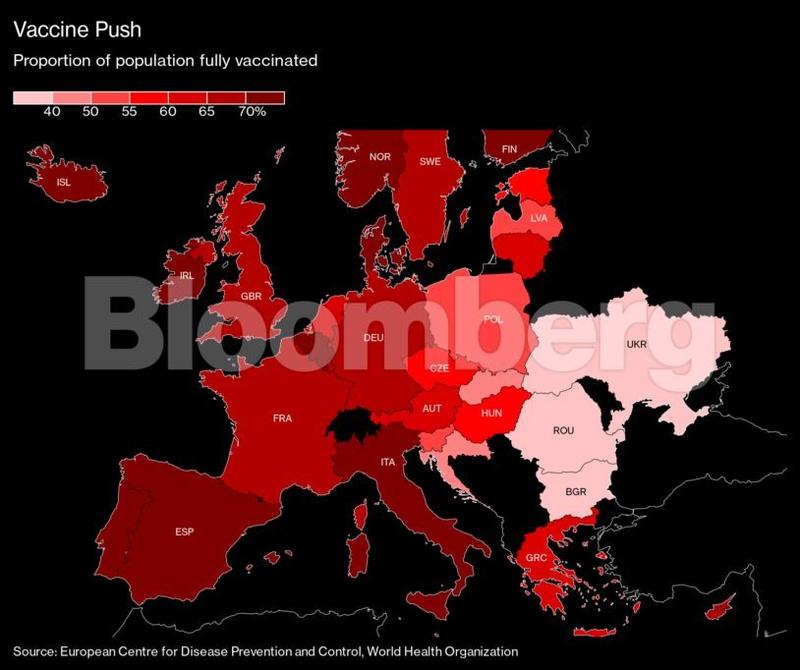
Waning antibody levels in some vaccinated people could also dramatically set back the virus battle. A number of countries are expanding their booster rollouts to sustain elevated levels of protection against COVID-19. Austria cut the validity of vaccine certs to nine months from 12 to encourage people to get a top-up shot.
Efforts to boost vaccinations have sometimes stumbled. Slovenia’s government faced protests after it tried in September to force unvaccinated public workers to work from home. The measure was ultimately halted by the country’s constitutional court.
Authorities have also been forced to revisit their COVID-19 testing strategies. Germany reversed a decision to scrap free rapid tests and is bringing them back in hopes of getting control of the explosion of cases.
But a negative test won’t buy freedom for the unvaccinated like it did in the summer and early fall. Instead, many places are adopting a model where you have to show proof of vaccination or a recent bout of COVID-19 along with a negative test. Where that’s not possible, big events are starting to get canceled.
That’s the case in Munich, where city officials on Tuesday said there will be no Christmas markets in the city center for the second year in a row. Smaller markets are still possible, for now, for the vaccinated, provided they bring a negative test result. But patrolling such a policy in the heart of Munich would be impossible.
“This is bitter news,” Mayor Dieter Reiter said. “But the dramatic situation in our hospitals and exponential rise in cases leave me no other choice.”
READ MORE: Report: 140,000 US children lose parents amid pandemic
France
The French Public Health Agency on Wednesday reported 20,294 new COVID-19 cases in the past 24 hours, bringing the total number of confirmed cases in the country to 7,330,958.
Fifty additional deaths related to COVID-19 were also recorded during the same period, with the total number of deaths due to coronavirus in France standing at 118,321.
The numbers of new hospital admissions and patients in critical conditions also continue to rise. According to the French Public Health Agency, 7,663 patients are currently hospitalized, 525 more than the day before. Meanwhile, 1,300 patients are in intensive care units, including 107 patients in the past 24 hours.
Francois Delfraissy, head of the scientific council that advises the government on COVID-19, has warned that France will face the acceleration of a fifth wave in the coming weeks.
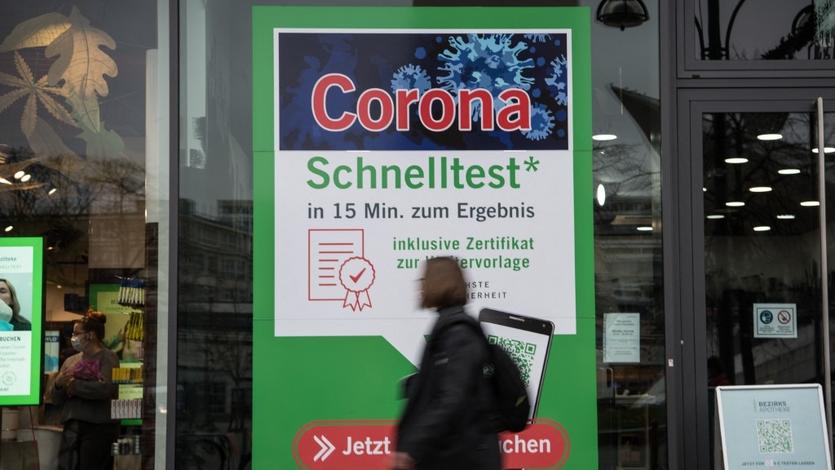 A passer-by walks in front of a Covid-19 test station on Nov 17, 2021 in Berlin, amid the COVID-19 pandemic. (STEFANIE LOOS / AFP)
A passer-by walks in front of a Covid-19 test station on Nov 17, 2021 in Berlin, amid the COVID-19 pandemic. (STEFANIE LOOS / AFP)
Germany
The number of COVID-19 cases in Germany rose by more than 60,000 for the first time, setting a record for a second straight day, according to data from the RKI public-health institute. COVID-19 infections surged by 65,371, while the number of deaths from the disease jumped by 264, taking the total to 98,538.
Chancellor Angela Merkel on Wednesday called the situation “dramatic” and said that the fourth wave of the pandemic is hitting Germany “with full force.” She’ll hold talks with regional premiers on Thursday to discuss the next steps.
Russia
Russia on Thursday reported 1,251 coronavirus-related deaths in the last 24 hours, an all-time record high that follows a surge in cases.
The government coronavirus taskforce reported 37,374 nationwide infections, down from a peak of 41,335 recorded on Nov 6.
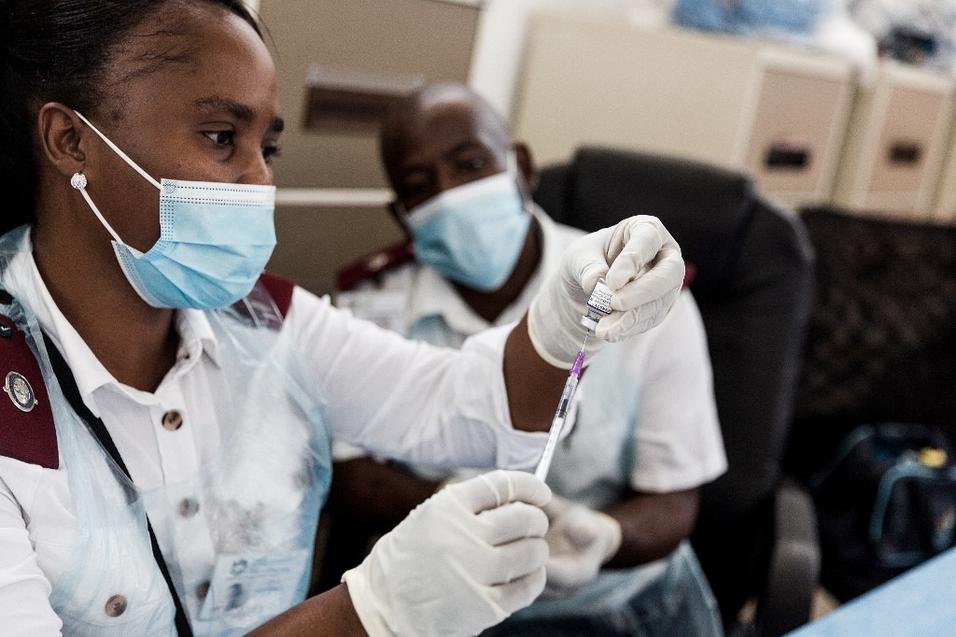 In this file photo taken on Sept 24, 2021,
health care workers prepare doses of the Pfizer vaccine ahead of a vaccination during the launch of the VaxuMzansi National Vaccine Day Campaign at the Gandhi Phoenix Settlement in Bhambayi township, north of Durban. (RAJESH JANTILAL / AFP)
In this file photo taken on Sept 24, 2021,
health care workers prepare doses of the Pfizer vaccine ahead of a vaccination during the launch of the VaxuMzansi National Vaccine Day Campaign at the Gandhi Phoenix Settlement in Bhambayi township, north of Durban. (RAJESH JANTILAL / AFP)
South Africa
South Africa, which has the most confirmed coronavirus cases on the continent, will likely be hit by a fourth wave of infections but its impact probably won’t be as severe as during earlier surges, new modelling prepared for the government shows.
Sero-prevalence surveys and other data indicate that an estimated 60 percent to 70 percent of the population has already contracted COVID-19, which together with vaccinations will provide protection from severe disease, the South African COVID-19 Modeling Consortium said in an online presentation on Wednesday. Even its worst-case scenario projected that deaths and hospitalizations during a fourth wave would be substantially lower than during prior surges.
While South Africa’s current caseload is “incredibly low”, it’s “very hard to commit to say South Africa is over the worst” of the coronavirus, said Harry Moultrie, a senior epidemiologist at the National Institute for Communicable Diseases, which coordinated the modeling.
“It’s going to be a bumpy ride,” he said. “We don’t know where this virus is going to take us. We will still be seeing hospital admissions and deaths related to COVID-19 for years to come.”
The seven-day rolling average of new infections in South Africa has dropped to below 300, from a third-wave peak of almost 20,000 in July.
The country has had 2.93 million confirmed coronavirus cases and 89,504 of those who’ve been diagnosed with the disease have died from it, although excess death numbers indicate the true toll may be much higher.
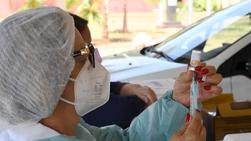 In this file photo taken on Sept 13, 2021, a
healthcare worker prepares a dose of the CoronaVac COVID-19 vaccine at a drive-thru vaccination post in Brasilia. (EVARISTO SA / AFP)
In this file photo taken on Sept 13, 2021, a
healthcare worker prepares a dose of the CoronaVac COVID-19 vaccine at a drive-thru vaccination post in Brasilia. (EVARISTO SA / AFP)
The Americans
COVID-19 deaths have decreased 17 percent in the Americas over the past week, but the most populous countries like the United States, Brazil and Colombia are seeing a leveling of new infections after weeks of declining trends, the Pan American Health Organization said on Wednesday.
Mexico is reporting an increase in new deaths and in the Caribbean Trinidad and Tobago had a sharp rise in deaths as intensive care unit beds fill with COVID-19 patients, PAHO said.
In an important milestone, half of the people in Latin America and the Caribbean have now been fully vaccinated against COVID-19, though coverage remains below 10 percent in Nicaragua and Haiti, PAHO Director Carissa Etienne said.
"The COVID pandemic is still very active in our region," she warned in a webcast news conference.
Countries across Central and South America have seen a decline in new infections, except for Bolivia, it said.
As Uruguay and Chile have relaxed pandemic restrictions, COVID-19 cases have spiked, even with their high vaccination coverage, the health agency said.
Etienne urged people in the region to get vaccinated and stick to social distancing and mask wearing as the holiday season approaches.
UK
A subvariant of Delta that is growing in Britain is less likely to lead to symptomatic COVID-19 infection, a coronavirus prevalence survey found, adding that overall cases had dropped from a peak in October.
The Imperial College London REACT-1 study, released on Thursday, found that the subvariant, known as AY 4.2, had grown to be nearly 12 percent of samples sequenced, but only a third had "classic" COVID-19 symptoms, compared with nearly a half of those with the currently dominant Delta lineage AY 4.
Two-thirds of people with AY 4.2 had "any" symptom, compared with more than three-quarters with AY 4.
AY 4.2 is thought to be slightly more transmissible, but it has not been shown to cause more severe disease or evade vaccines more easily than Delta.
The researchers said that asymptomatic people might self-isolate less, but also that people with fewer symptoms might spread it less easily through coughing and also may be unlikely to get severely ill.


